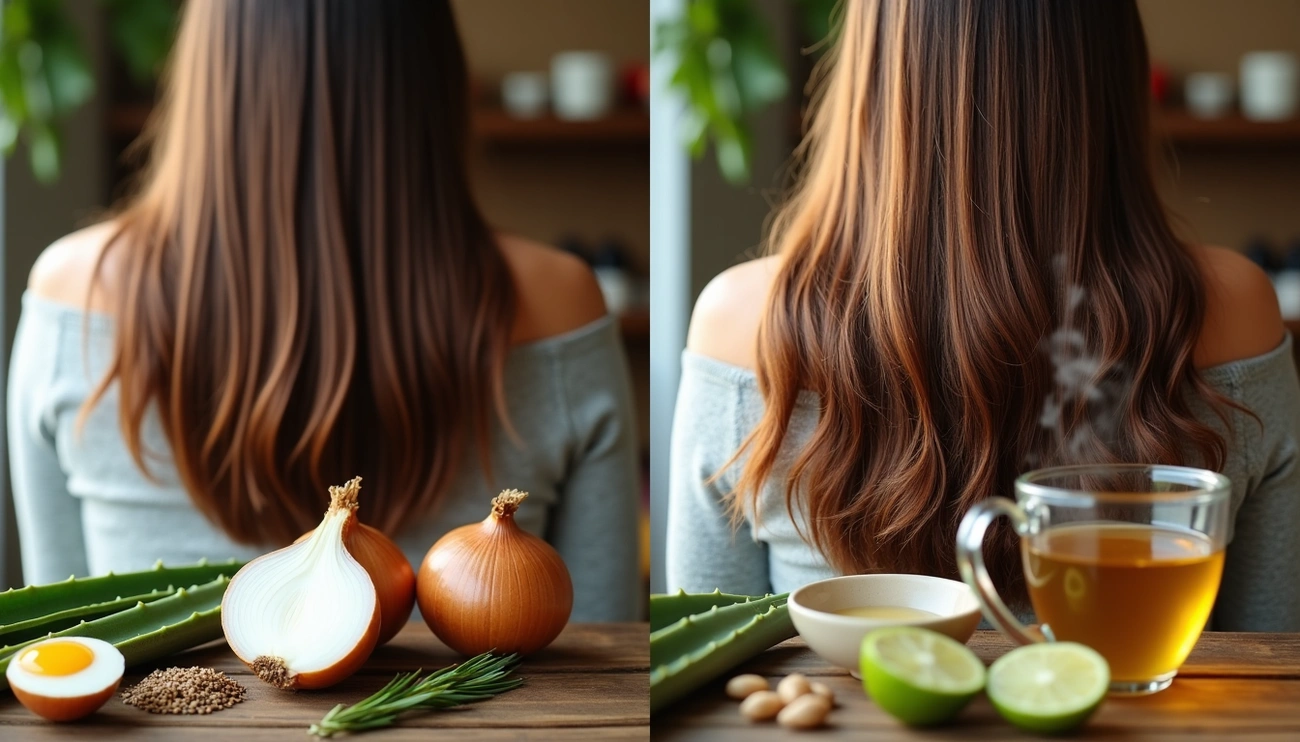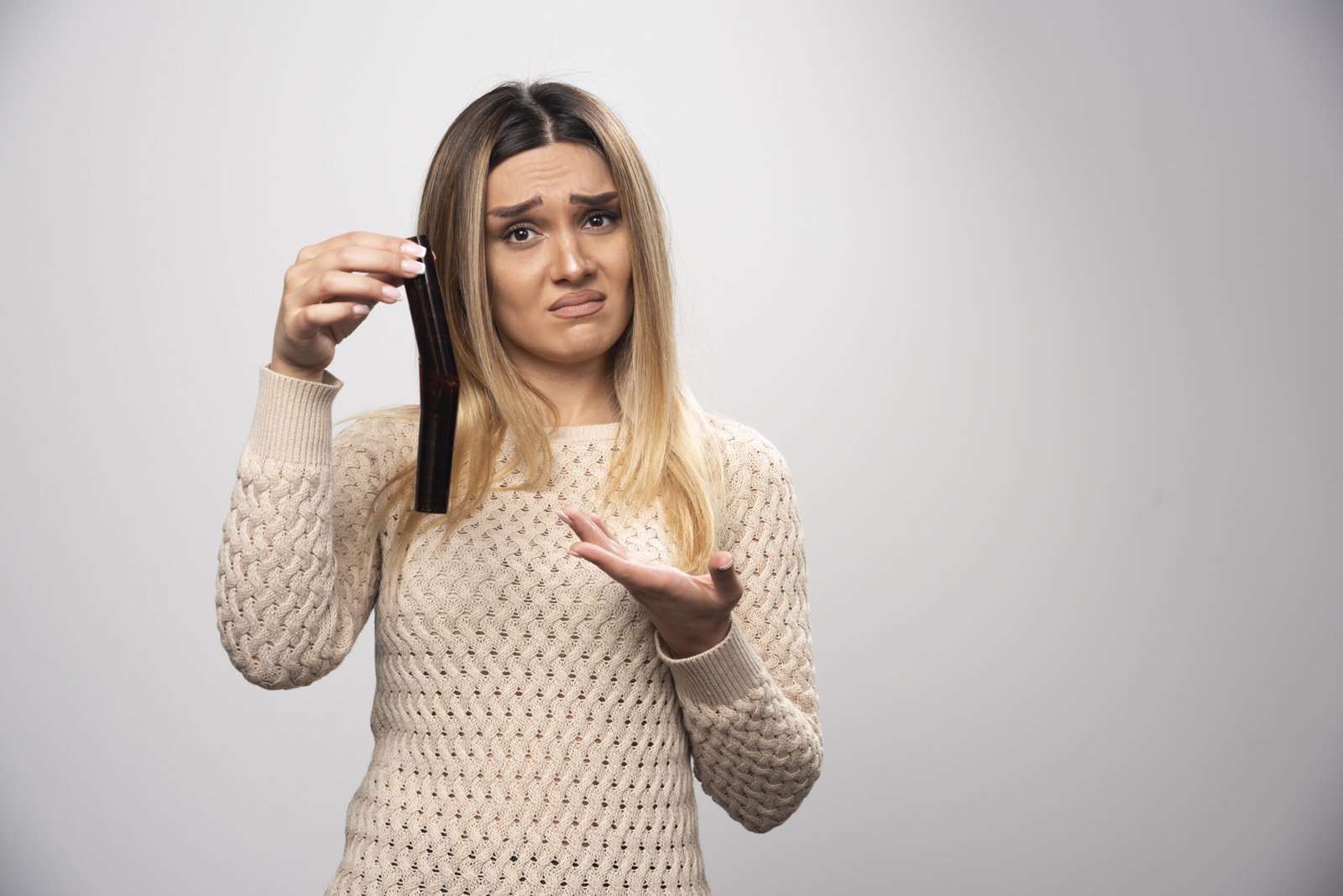Did you know that we naturally lose between 50 and 100 hairs each day? Finding more than that on your pillow or shower drain signals the need to look for a hair fall solution at home.
Hair loss can significantly impact your self-esteem and confidence. The thought of going bald, especially at a young age, can be overwhelming.
The good news? You don’t need expensive treatments to tackle this problem. Natural remedies can work wonders when used consistently.
This piece shares eight powerful home remedies for hair fall and regrowth that you can start using tonight. These aren’t random solutions – they’re time-tested methods to stop hair fall at home without harsh chemicals.
The text also explains why sudden hair loss occurs and how you can naturally control it before it becomes a serious concern.
Let’s tuck into these simple yet effective hair fall control home remedies that your grandmother probably never mentioned!
Why Does Hair Fall Suddenly
You may have noticed that your hairbrush is collecting more hair than usual lately. The first step to finding affordable hair fall solutions at home starts with understanding why this happens.
Common triggers like stress and diet
After genetics, stress is the leading cause of sudden hair loss. Your body releases cortisol at the time you’re stressed, which can force more hair follicles into the resting (telogen) phase too early.
This condition, known as telogen effluvium, shows up 3-6 months after a stressful event.
These stress triggers often lead to hair fall:
- Big life changes like divorce or job loss
- Recovery from serious illness
- Childbirth
- Rapid weight loss
- Stopping birth control pills
The food you eat plays a vital role in maintaining healthy hair. Not getting enough nutrients can significantly impact how your hair grows and stays healthy.
Studies show that low protein levels or deficiencies in iron, vitamin B12, or biotin can weaken hair follicles and cause them to fall out more easily. Crash diets that cause quick weight loss also tend to trigger extra shedding.
There’s another reason – your grooming habits. Tight hairstyles, such as ponytails, braids, and extensions, can damage follicles.
Hair products with harsh chemicals might also weaken your hair’s structure over time.
When to worry about hair fall
Losing 50-100 hairs daily is normal. Notwithstanding that, you might need to check with a doctor if you see much more hair falling out than usual.
You should get medical help if you notice:
- Hair coming out in clumps
- Sudden bald spots or thinning areas
- Your scalp feels irritated, burns, or itches constantly
- Changes in your hairline
- Loss of body hair along with scalp hair
Hair shedding that persists for more than 6-9 months requires professional attention. The shedding usually stops once you address the underlying cause, but ongoing loss may indicate a more serious issue.
So, if hair fall worries you, try a simple “pull test”. Gently run your fingers through clean, dry hair and pull. One or two strands coming out is fine, but several strands may indicate excessive shedding.
Most cases of sudden hair loss get better on their own within 6-12 months. Still, seeing a doctor helps identify the cause early.
A dermatologist can determine whether you’re experiencing temporary shedding or actual hair loss, allowing you to initiate the proper treatment sooner.
8 Home Remedies to Stop Hair Fall Tonight
Want quick solutions to fix your hair fall problems tonight? These eight powerful home remedies will rejuvenate your scalp and strengthen your hair from the very first use.

1. Onion Juice: Boost blood flow to follicles
Onion juice contains sulfur that makes hair strands stronger and helps them grow. Your hair follicles get better blood circulation and essential nutrients from this potent remedy.
To use:
- Blend an onion and strain to extract the juice
- Please put it on your scalp with cotton balls
- Let it sit for 15-30 minutes
- Clean it off with a mild shampoo
Research shows that people who apply onion juice to their scalps twice daily experience significantly more hair growth than those who use tap water. You’ll see the best results if you use it 2-3 times each week.
2. Aloe Vera: Soothe and unclog scalp pores
Aloe vera cleans your hair shaft without causing any damage. The proteolytic enzymes fix dead skin cells on your scalp and improve circulation.
To apply:
- Get fresh gel from an aloe leaf
- Rub it into your scalp and hair
- Wait for 30-60 minutes
- Wash with mild shampoo
The vitamins A, C, and E in aloe vera support cell turnover and promote healthy hair growth. Regular use helps calm inflammation and clear hair follicles that are blocked by excess oil.
3. Coconut Oil: Deep nourishment and repair
Your hair shaft absorbs coconut oil easily because of its unique structure. This prevents moisture loss and strengthens hair. The high fat content locks in moisture and stops protein loss.
Application method:
- Warm the oil slightly in your palms
- Rub it into your scalp using circular motions
- Keep it overnight or at least one hour
- Clean with a gentle shampoo
Studies show that hair treated with coconut oil once or twice a week breaks less compared to untreated hair.
4. Fenugreek (Methi): Strengthen roots naturally
Fenugreek seeds pack protein and iron, key nutrients for hair growth. These seeds contain special plant compounds, such as flavonoids and saponins, which help promote growth by reducing inflammation.
Quick preparation:
- Soak 2-3 tablespoons of fenugreek seeds overnight
- Make them into a paste in the morning
- Could you put it on your scalp and hair?
- Wash off after 30 minutes.
Research involving 53 individuals who took fenugreek seed extract showed that all but one participant experienced improved hair volume and thickness after six months.
5. Egg Mask: Protein boost for weak strands
Eggs provide your hair with protein, making it healthier and shinier. The sulfur in egg yolks makes your hair shaft stronger and prevents breakage.
Simple egg mask recipe:
- Mix 2-3 whole eggs with 2-3 drops of lemon juice
- Beat until frothy
- Spread it evenly on the scalp and hair
- Put on a shower cap for 20 minutes
- Rinse with cool water (hot water makes eggs clump)
You can add honey, banana, or coconut oil to enhance the benefits of your egg mask.
6. Amla and Lime: Vitamin C for scalp health
Amla (Indian gooseberry) has more vitamin C than oranges. This helps slow down the aging of hair and skin.
Your scalp receives improved blood flow, which sends nutrients to the hair roots.
Preparation:
- Mix one teaspoon of amla powder with some lime juice drops
- Please put it on your scalp and wait 40 minutes
- Clean with a mild cleanser
This mix helps fight oil buildup and germs that cause dandruff, thereby resetting your scalp’s health.
7. Green Tea Rinse: Antioxidants for hair regrowth
Green tea contains potent antioxidants, particularly EGCG, which may help prevent hair loss and promote new growth.
A small study found that applying green tea extract to the scalp resulted in significantly more hair growth after just 4 days.
Easy preparation:
- Steep 1-2 green tea bags in hot water for 5 minutes
- Let it cool down completely
- Pour it over hair after shampooing
- Rub it gently into your scalp
- Leave it on
Green tea improves blood flow and delivers more oxygen to your scalp, potentially supporting hair growth.
8. Rosemary Oil: Stimulate hair growth naturally
Rosemary oil is as effective as minoxidil for hair regrowth without causing scalp itchiness. It helps by improving blood flow to hair follicles.
Application method:
- Mix five drops of rosemary oil with a teaspoon of carrier oil
- Rub into your scalp and hair
- Keep it for 5-10 minutes or overnight
- Wash thoroughly
Studies show that using rosemary oil 2-3 times a week for six months can improve hair growth.
How to Use These Remedies Safely
Success with home treatments depends on both the products you choose and your adherence to safe practices. Natural remedies can cause reactions when misused. Here’s how you can get the best results while staying secure.
Patch testing and allergy precautions
Natural ingredients can trigger allergic reactions. Before you apply any remedy to your entire scalp:
- Do a patch test by applying a small amount to your inner wrist or behind your ear
- Wait 24 hours to check for reactions like redness, itching, or swelling
- This step becomes vital for essential oils like rosemary and tea tree
Essential oils should be mixed with carrier oils, such as coconut or olive oil, and never applied directly to the skin.
This mix prevents irritation while giving you the benefits. Individuals with sensitive skin should conduct patch tests.
How often to apply each remedy
Your hair type and concerns determine how often you should use these treatments:
For dry hair and scalp:
- Use oil-based remedies 2-3 times weekly to bring back moisture
- Apply protein treatments like egg masks once weekly to avoid protein overload
For oily hair and scalp:
- Keep oil treatments to once weekly
- Try astringent remedies like green tea rinses 2-3 times weekly
Normal hair responds well to treatments 1-2 times a week.
During periods of heavy hair loss, you can increase your strengthening treatments to 2-3 times a week.
Combining remedies for better results
Some combinations work together to boost results:
- Add a few drops of rosemary oil to coconut oil to improve circulation and moisture
- Mix aloe vera gel with fenugreek paste for soothing and strengthening benefits
You should ask a healthcare professional before mixing different remedies, especially when using supplements with topical treatments. This helps avoid any unwanted effects or interactions.
Stop using any remedy immediately if you notice more hair fall, and try something different. Note that patience is key; many remedies need several weeks of regular use to show results. Your doctor’s evaluation becomes necessary if hair fall continues beyond 6-9 months.
Diet and Lifestyle Tweaks That Support Hair Regrowth
The best solutions for hair fall might be sitting right in your kitchen. Your eating habits and lifestyle choices affect your hair’s health and growth cycle.
Foods that reduce hair fall
Strong hair needs specific nutrients from a balanced diet. Hair follicles contain mostly protein, and low protein intake could trigger hair loss.
Here are some foods you should eat daily:
- Salmon and mackerel provide omega-3 fatty acids and vitamin D3 that help increase hair density
- Eggs give you biotin and protein – the building blocks of keratin
- Spinach and other leafy greens pack iron, folate, and vitamin A – key nutrients for hair growth
- Berries shield hair follicles from damage with vitamin C
- Nuts and seeds supply vitamin E, zinc, and selenium, which keep hair healthy
Research shows that supplements containing omega-3 and omega-6 fatty acids, combined with antioxidants, can help reduce hair loss and improve hair density.
You should also limit your intake of sugar, refined carbohydrates, and fried foods to prevent hormone fluctuations that can cause hair thinning.
Hydration and sleep
Quality sleep regulates many biological functions that support hair growth.
The National Center for Biotechnology Information’s research found that stress directly slows hair growth, as hair follicles showed degranulation during stress response.
Your body needs at least 2 liters of water daily to keep your scalp hydrated. A dry scalp slows down hair growth. You can stay hydrated by:
- Eating water-rich fruits like cucumbers, watermelon, and strawberries
- Choosing fruit-infused or coconut water over sugary drinks
Avoiding heat and harsh products
Heat styling tools can damage your hair by stripping away moisture and weakening the strands. Style your hair with heat tools early in the day so it has time to recover before bed.
These protective steps can help:
- Clean your hair with mild shampoo before bed to remove buildup
- Sleep on a silk or satin pillowcase or wrap your hair in a silk scarf to reduce friction
- Let overnight treatments repair and moisturize your hair
When to See a Doctor for Hair Fall
Home remedies can work wonders for most hair fall concerns. Sometimes you need medical attention. Getting professional help at the right time can make the most critical difference to your hair’s recovery trip.
Signs of why it happens
You should contact your doctor right away if you notice:
- Sudden excessive shedding where hair comes out in handfuls
- Burning, itching, or irritation on your scalp
- Patchy hair loss or noticeable bald spots
- Hair loss with unexplained symptoms
- Body hair loss among scalp hair
Women who have a receding hairline (frontal fibrosing alopecia) should get early treatment to prevent permanent baldness.
Hair loss that persists beyond 6-9 months, despite home remedies, requires professional evaluation.
What a dermatologist can do
A dermatologist, a doctor who specializes in skin and scalp health, can help you in several ways:
- Accurate diagnosis through physical examination, medical history review, and hair pattern analysis
- Specialized testing, including blood tests to check for medical conditions, thyroid problems, or nutritional deficiencies, tests to determine the stage of shedding, and scalp biopsies to examine hair roots microscopically
Better outcomes come from early treatment of hair loss. You should not wait to get professional help if home remedies haven’t worked after several months of regular use.
Conclusion
Hair fall can feel overwhelming. Your kitchen holds many natural solutions that work just as well as, if not better than, expensive treatments.
Eight powerful home remedies, including onion juice, aloe vera, rosemary oil, and fenugreek, tackle hair fall without harsh chemicals.
The root cause of your hair loss determines the best treatment approach.
Excessive shedding often stems from stress, poor nutrition, or improper hair care. Natural treatments can effectively reverse these issues.
These remedies require time to show results; some work quickly, while others may take weeks of regular use.
The best results are achieved by combining topical treatments with healthier lifestyle choices. Staying hydrated, sleeping well, and eating nutrient-rich foods make a big difference.
Natural remedies can help most people, but be aware of potential warning signs. Seek medical attention if you notice sudden, heavy shedding, scalp irritation, or patchy hair loss.
Your hair’s health depends on simple, consistent care. These time-tested remedies will reduce the hair on your pillow and keep it where it belongs – on your head.
Pick any of these gentle yet powerful remedies tonight and watch your hair go from falling to flourishing.


1 thought on “Stop Hair Fall Tonight: 8 Best Home Remedies”